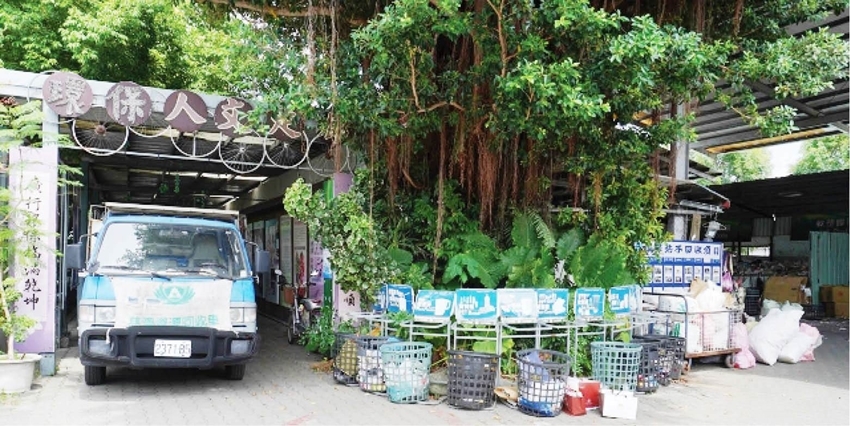    |
 |
| A recycling pick-up point |
Though Taiwan historically used to be called "Garbage Island", I was very surprised and impressed with the green and clean island, as well as very high awareness of waste segregation and recycling. In Taiwan, the most crowded time of the day is probably the " waste pickup time", because when the music signaling the arrival of the waste trucks plays, people carry their bags and buckets of leftover food to the sidewalk and wait for the trucks.
Waste bags come in many colors, depending on each local regulation. Waste is segregated into several classifications of paper and paper boxes; glass bottles; metal cans and jars; ordinary waste; and food waste. Regular waste trucks arrive first, then following the recycling waste trucks with bins installed onto them to collect leftover food.
The lunch boxes or bottles are also washed before being discarded. Leftover food will be processed to make animal feed or fertilizer. Recycled waste is processed according to its functions.
In the summer of 2022, I had the opportunity to go to the Tzu Chi Foundation (Tu Te), an international NGO of Taiwan. This is a large Buddhist charity with more than 500 offices in 66 countries, operating in four main areas of charity, medicine, education, and humanitarian relief. In particular, the Tzu Chi is very famous for recycling waste into useful products in relief programs.
In the course of history, Taiwan has been making efforts to improve the environment since the late 1990s. The authority has invested in waste management infrastructure, waste collection trucks, waste treatment and incineration plants. Laws and policies have been promulgated to protect the environment, and encourage people to raise awareness and responsibility in sorting and recycling waste.
However, at first, people strongly reacted to recycling, as they thought that they had paid taxes, then waste treatment was the responsibility of the authority; thus, the issue of environmental education in schools was promoted.
As being a non-governmental organization, with the advantage of having religious element, Venerable Dharma Master Cheng Yen (the founder of Tzu Chi Foundation) often speaks at schools and on television, calling on people to be united in the effort of waste segregation. The Venerable Dharma Master also emphasizes that people collecting and handling waste are not the one from low class in the society, but they deserve to be respected and honored.
Since 2000, Tzu Chi has collected various types of waste, which is handled in classifications of plastic bottles, paper, laminate packaging, metal, batteries, and old clothes. The highest amount of waste that the Tzu Chi Foundation has ever handled was seen in 2006, with more than 157 million tons of waste, about 7.48% of the total amount of waste in the country. The ratio of waste treatment to the total amount of waste has gradually decreased over the years along with the development of government agencies and other private organizations. The Tzu Chi Foundation has no longer played a major role in handling waste such as bottles, paper, clothing, batteries, metal and other recyclable waste; excluding laminate packaging, which the Foundation has still play a very important role and handled over 20% of the total waste of the same classification on the whole island in 2021.
In 2006, the Tzu Chi Foundation began to research and develop the process of recycling PET plastic bottles into cloth. In December 2008, DA.AI Technology was established, responsible for developing textiles from recycled raw materials, such as recycled poly chips, recycled polyester fibers and recycled fabrics.
DA.AI Tech's manufacturing process received Global Recycling Standard (GRS) certification from the Netherlands' Peterson Control Union for rigorous quality control. As of 2020, Tzu Chi has distributed 1,172,668 ecological blankets to disaster sites in 44 countries and regions.
Thanks to the efforts from the government, social organizations and people, Taiwan is globally famous for its waste recycling. The recycling industry is worth hundreds of billions of dollars, with the plastic recycling industry being the most successful. Nearly two-thirds of Taiwan's PET bottle plastic is recycled into textile fibers, at the request of domestic textile companies or foreign manufacturers, for the production of shoes and sportswear.
As Hue, a place with gentle nature, heritage and people, always strives to build a unique ecological and heritage urban, I think that Hue can consider the case of Taiwan and the model of the Tzu Chi Foundation in the issue of reducing plastic waste for references.
The first of all is to consider and make regulations on waste segregation. Consideration may be given to the use of two waste trucks running one after another, one for general waste and one for recycling waste; as well as setting up stations to collect and segregate recyclable waste. Beside the policies of Hue City’s government, monasteries, temples or religious establishments, and associations can deliver sermons, calling on believers to protect the environment and joining hands to segregate waste.
Secondly, consulting the Tzu Chi Foundation and DA.AI Technology (https://daaitechnology.com) for researching and developing recycling processes, or implementing policies to attract businesses in this sector. Finally, there should be heavy sanctions for acts of polluting the environment and littering in public places.
Combining the efforts from the government and people, socio-political organizations, non-governmental organizations, and religious communities, it can be confident that the problem of plastic waste will be effectively solved, and this contest is a positive start.